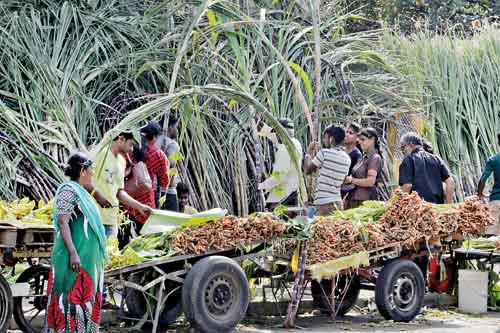Keeping a unique thanksgiving alive
It is once more the time for kolam designs on the floor and modakam to feast on. While homes have been decluttered and colour-washed, today devotees will throng the kovils for poojas in reverence of the Sun God for a bountiful harvest. Thai Pongal in a broad sense which denotes ‘festivity’ or ‘celebration’ is an important festival for Hindus across the world and of national significance here at home. The four-day festival according to the Tamil almanac is usually celebrated from January14 to 17.

Sugarcane and other delicacies on sale in Wellawatte, Colombo for Thai Pongal
The astronomical basis of Thai Pongal as historian and Chancellor of the Jaffna University, Prof. S. Pathmanathan tells the Sunday Times, is that it marks the beginning of a new season. “While Thai refers to the January-February season in the Tamil calendar, pongal means ‘abundance’ or ‘overflow’. It marks the Makara Sankranti or the first day of the sun’s transit into the Makara (Capricorn), as it moves from the winter solstice to the summer solstice, marking the beginning of longer days of uninterrupted sunlight.”
From a traditional, cultural perspective, the festival is a celebration by the agricultural community, showing gratitude to the Surya or the Sun God for his benevolence. “In a modern context however, the festival has moved beyond the farmer community to be embraced by the entire Hindu populace,” observes Prof. Pathmanathan. The festival is also significant as it falls a few days after Tiruppavai and Tiruvempavai, the most sacred temple festivals of Vaishnavism and Shaivism, the two major traditions of Hinduism, he adds.
While houses are cleaned and embellished with banana and mango leaves, the womenfolk are busy creating kolam made out of dry rice flour. Special poojas and rituals are associated with Thai Pongal. The ablutions prior to all rituals associated with the festival mirror the sanctity it entails. The special milk rice or paalsooru is cooked with fresh milk in a new earthenpot usually in the porch or the courtyard of the home in sunlight. The special pongalsooru, as Prof. Pathmanthan explains, is often flavoured with cane sugar jaggery, cardamom, cashew and plums and served on a banana leaf accompanied by an assortment of sweetmeats.
The offerings are first made to the Sun God along with seasonal fruits such as banana, lemon, orange and pomegranate. At homes, incense is burnt.
“The festival also enables family reunions when all get together and worship the Sun God and recite sacred hymns. The sacred rituals are often followed by the partaking of the festive morning meal and the exchange of gifts,” explains the Prof.

Prof. S. Pathmanathan
The regional influence of India on this harvest festival is also notable, opines Prof. Pathmanathan. “Although the festival is most robust in Southern India, particularly in Tamil Nadu, the traditions have been influenced by the other regional flavours as well. In terms of the Sri Lankan setting too, there is variation between the Jaffna tradition and the Batticaloa tradition of celebrations.” The festival although traditionally spreads over four days, marked by Bhogi, Thai Pongal, Mattu Pongal and Kaanum Pongal, is largely confined to two days here at home, he says.
In a mark of respect to the cattle that play a pivotal role in agricultural pursuits, Mattu Pongal which follows Thai Pongal is dedicated to the cows. Once they are bathed and cleansed with vermilion, cows are adorned with garlands, bells and sheaves of corn. “The special pongal delicacies are also offered to the cattle and they are relieved of the day’s work,” says Prof. Pathmanathan.
Recollecting his Thai Pongal memories of Jaffna before the war, he adds that the rituals are getting distant from the younger generation, especially those associated with the agrarian setting. “Society has been transformed completely and once a person is removed from the ancestral habitation, rituals become challenging to observe,” maintains Prof. Pathmanthan who goes on to note that the war had led to a ‘total dislocation of society’. “Terror and displacement too contributed to the abandonment of traditional customs. Although some of these have been revived with the displaced returning to their ancestral settings, the toll the conflict had on culture is unprecedented, he notes. “Reconciliation is all about understanding and respecting each other’s cultures and Thai Pongal being a national festival of the country is ideal to reflect on this,” says the scholar who urges all Lankans to join hands with their Hindu brethren and experience this unique thanksgiving festival.


